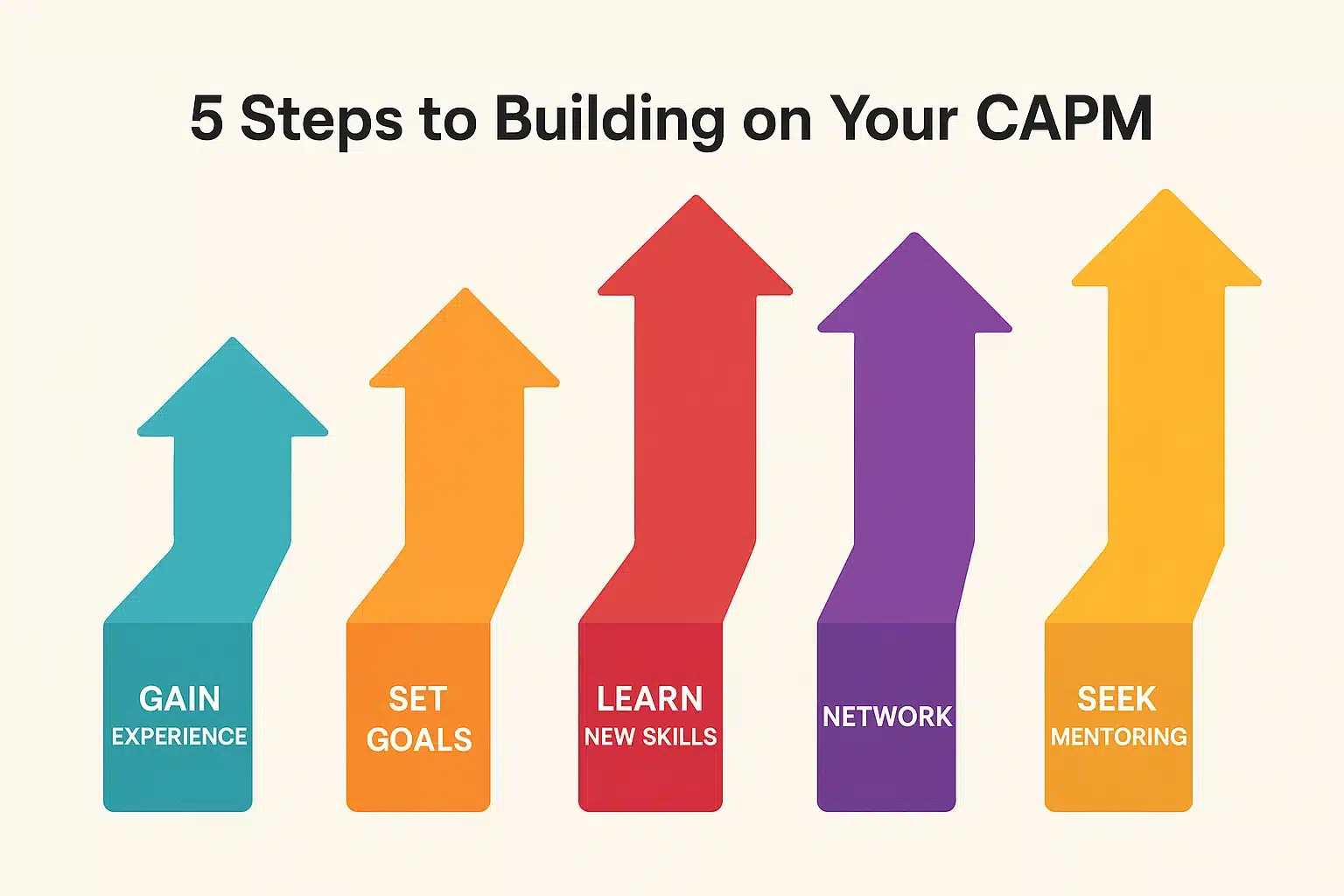CAPM® Project Manager Certification: ROSEMET and Becoming Certified
Author: Hajime Estanislao, PMP®; Editor: Geram Lompon; Reviewed by: Alvin Villanueva, PMP®, PMI-ACP®
Project management is one of the fastest-growing professional fields, driving career opportunities in technology, healthcare, finance, and construction. For those starting their careers in
There is a growing demand for skilled project managers, driven by a widening talent gap in the industry. These trends have significant global implications as organizations worldwide face workforce shortages and seek to address talent gaps in project management.
The Certified Associate in Project Management (CAPM®) from PMI® demonstrates knowledge of
ROSEMET helps candidates meet the prerequisites, prepare effectively, and apply knowledge in real-world contexts. Passing the CAPM® is not merely about earning a credential; it is also about developing skills that can be further enhanced with subsequent certifications, such as the PMP or PMI Agile Certified Practitioner (PMI-ACP®).
What is CAPM and Becoming Certified
The CAPM certification validates a candidate’s grasp of project management principles, processes, and terminology. By meeting
It proves readiness to contribute to project teams and handle both predictive and agile environments. Organizations and employers value the CAPM certification when hiring or promoting project management professionals, as it demonstrates a commitment to industry standards and recognized qualifications.
Purpose of CAPM
CAPM-certified professionals demonstrate their ability to:
- Apply the foundations of project management across industries.
- Utilize standardized process groups to manage project phases.
- Support agile practices alongside traditional methods.
- Assist with business analysis frameworks, including requirements gathering and stakeholder engagement.
- Utilize
project management tools and reference theproject management body of knowledge, such as the PMBOK® Guide, to enhance project planning, exam preparation, and professional development.
Why Certification Matters
Becoming certified provides:
- Credibility as a trained project professional.
- Demonstrates your commitment to professional growth and dedication to the project management field.
- Access to PMI’s global network and resources.
- Career mobility across industries.
- Project management makes professionals more attractive in the job market and can lead to better career opportunities and higher salaries.
- A stepping stone to advanced credentials such as PMP and PMI-ACP.

Leveraging Core Project Management Knowledge with Examples
Passing the CAPM equips professionals with knowledge that translates directly into workplace contributions.
- Process knowledge in action: A CAPM holder supporting a product launch can help track schedules, monitor milestones, and assist in reporting progress.
- In a construction project, associates certified in CAPM can develop work breakdown structures and contribute to Gantt charts to ensure alignment and project success.
- Agile applications: Within a software team, they can manage sprint boards, support backlog refinement, and document daily progress.
- Business analysis: On a marketing project, they might gather stakeholder requirements and confirm that deliverables meet business goals.
Applying CAPM knowledge in these roles allows professionals to gain valuable project management experience, which is essential for career advancement.
As they gain project management experience, they position themselves for a higher average salary and greater potential earnings as they advance into senior roles or pursue additional certifications.
By applying CAPM knowledge, professionals bridge the gap between theory and execution, proving their value in diverse environments.
Online Project Management Training
Online project management training is a flexible and accessible option for professionals looking to acquire the knowledge and skills needed for the CAPM certification. With a wide range of online courses and training programs available, candidates can select options that suit their schedules and learning styles.
These online courses typically cover all essential topics in
For busy professionals or those without access to traditional classroom settings, online
What’s Next After CAPM?
The CAPM is a foundation, not an endpoint. Once certified, professionals can expand their expertise with advanced PMI credentials.
- PMP Certification: Focuses on leadership, advanced risk management, and strategic project delivery. It prepares professionals to lead entire projects and align initiatives with organizational goals. Having a four-year degree or an associate degree can impact PMP eligibility, as a four-year degree reduces the required project management experience, and an associate degree is also recognized as a qualifying educational background.
- PMI-ACP Certification: Tailored for those working in adaptive environments, PMI-ACP develops skills in Scrum, Kanban, Lean, and hybrid methods. It emphasizes agility, collaboration, and delivering continuous value.
- Specialized training: Additional options in scheduling, risk management, or business analysis can help further refine your professional focus.
Together, CAPM, PMP, and PMI-ACP form a career ladder that increases responsibility, earning potential, and professional reach.

5 Steps to Building on Your CAPM
Apply CAPM knowledge immediately.
Use newly acquired skills in your current role, such as preparing documentation, assisting with scheduling, or supporting risk registers.
Seek mentorship
Learn from senior project managers to understand how certified knowledge translates into leadership decisions.
Pursue continuous education
Earn PDUs and enroll in advanced project management courses to maintain your credential and expand your capabilities. Be sure to complete all required coursework as part of your enrollment to fulfill certification requirements and advance your skills. Providers like ROSEMET offer structured course programs for both CAPM maintenance and progression.
Prepare for advanced certifications.
Track the eligibility requirements for PMP or PMI-ACP early. As you gain project experience, align your efforts with exam prerequisites.
Step into leadership roles
Transition from supporting projects to leading teams, managing budgets, and engaging stakeholders, building the confidence to take on higher responsibilities.
This roadmap ensures CAPM is not just a certificate but the first stage of a progressive project management career.
PMP Certification: The Next Level
After achieving the CAPM certification, many project managers set their sights on the
ROSEMET: Your Partner in CAPM and Beyond
ROSEMET offers training that supports every step of the certification journey.
- Education fulfillment: Courses are led by experienced instructors and satisfy PMI’s 23-hour prerequisite, fulfilling the required hours of project management education for CAPM eligibility.
- Practice-driven preparation: Mock exams and analytics highlight strengths and close knowledge gaps, preparing candidates to succeed on the CAPM test.
- Structured curriculum: Aligns with PMI’s Exam Content Outline, integrating fundamentals, agile, and business analysis.
- Support for the future: ROSEMET also prepares professionals for PMP and PMI-ACP, helping them leverage CAPM into higher-level credentials.
With ROSEMET, professionals don’t just prepare for the exam—they gain a structured foundation for continuous development.
Conclusion
The CAPM certification provides professionals with the skills to support projects effectively, from managing schedules to engaging stakeholders. More importantly, it creates a foundation for growth.
The cost of obtaining the CAPM certification varies, with PMI members benefiting from reduced exam fees compared to non-members, making membership a valuable investment. When considering the overall costs, including exam fees and membership dues, many employers offer support or reimbursement to help offset these expenses.
Statistics and employment trends indicate that the demand for project management positions will continue to grow, providing strong job prospects and career advancement opportunities for certified professionals.
By applying CAPM knowledge, seeking mentorship, and pursuing advanced certifications such as the PMP and PMI-ACP, professionals can move from entry-level roles to leading complex initiatives.
With ROSEMET’s guidance, candidates gain not only the knowledge to pass the exam but also the confidence to apply, adapt, and expand their skills throughout their careers. CAPM is the start of a journey—ROSEMET helps ensure it leads to long-term success.
References:
Project Management Institute. (2021). A guide to the project management body of knowledge (PMBOK® guide) – Seventh edition, and the standard for
Project Management Institute. (2023). Certified Associate in Project Management (CAPM)® exam content outline. Project Management Institute. https://www.pmi.org/-/media/pmi/documents/public/pdf/certifications/capm20ecofinal.pdf
U.S. Bureau of Labor Statistics. (2024). Project Management Specialists: Occupational Outlook Handbook. U.S. Department of Labor. https://www.bls.gov/ooh/management/project-management-specialists.htm

